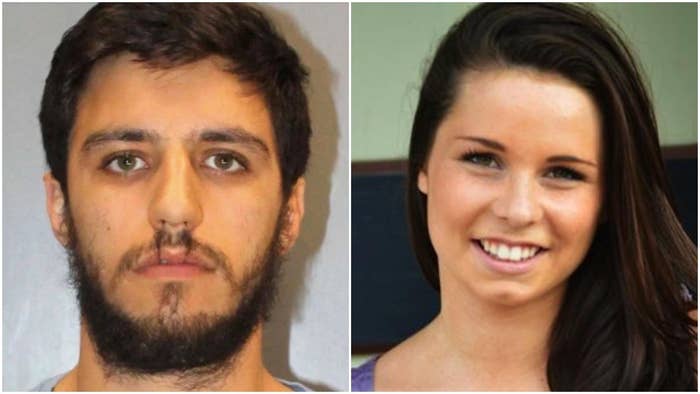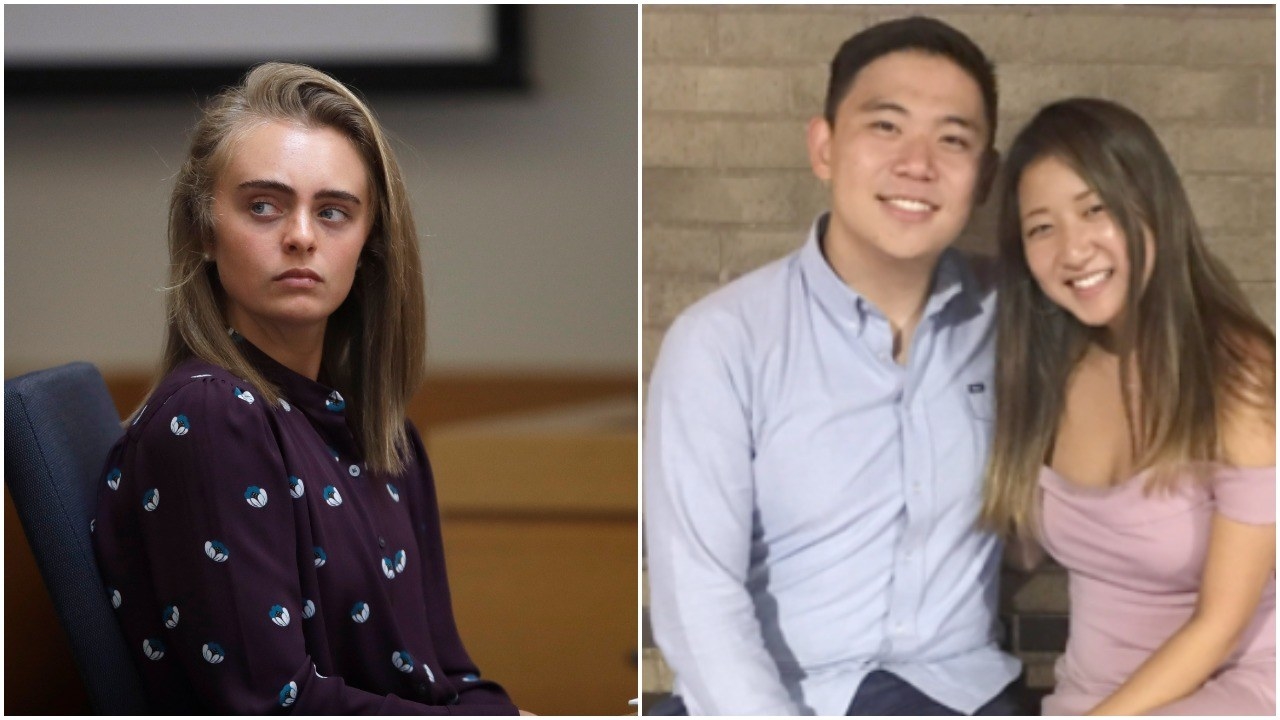
Three days before she died, Rachel Bandman texted her close friend, Anthony “A.J.” Hunt: “It’s frustrating how I can’t die.”
Bandman, a 19-year-old public relations major and sorority member at the University of South Carolina, had depression and tried to kill herself by ingesting 20 prescription-strength pills that Hunt had sold her.
When she texted Hunt that the tablets had not worked, he wrote back, “I don't know how the fuck 20 didn't work.”
“I need more for it to happen,” Bandman replied, according to court transcripts.
Hunt, then a 21-year-old drug dealer in Columbia, South Carolina, who had dropped out of the university, sold Bandman more of the same pills. They didn’t kill her.
Then Hunt told Bandman to take a combination of a certain quantity and potency of oxycodone tablets and two other substances.
He also texted her instructions on how to take the oxycodone — a highly addictive prescription opioid.
He sold her the tablets on Jan. 27, 2016.
“You doing it tonight?” Hunt texted Bandman that day.
"No,” Bandman said.
“Why not,” Hunt replied.
"Because I want to wait until my roommates are gone,” Bandman told him.
The next day, Hunt and one of Bandman’s roommates found her dead in her apartment. Hunt called 911 after seeing her unresponsive on the floor with blood coming down her nose. She had died of an oxycodone overdose.
On Tuesday, Hunt, 24, was sentenced to over 24 years in prison after he pleaded guilty in federal court to the illegal distribution of oxycodone resulting in death. After his arrest in 2018, Hunt admitted to law enforcement that he had sold the oxycodone to Bandman knowing that she intended to kill herself.
The case is a tragic example of how deaths by suicides and opioid overdoses are rapidly increasing across the country — and are affecting vulnerable people on college campuses.
In 2017, suicide was the second leading cause of death in the US for people between the ages of 10 to 34, just behind unintentional accidents like drug overdoses, according to the Centers for Disease Control and Prevention. In the same year, there were more than 70,000 drug overdose deaths in the US driven primarily by opioids.
“This story is a horrendous national example of just how far and badly the opioid epidemic has proliferated,” James Hodge, a professor of public health law and ethics at the Sandra Day O'Connor College of Law, told BuzzFeed News.
“When you’re dealing drugs, to think that your next intervention is to intentionally and knowingly bring about the death of one of your customers as if that’s a selling point or a gesture of mercy, it’s beyond unethical,” Hodge said. “It’s profoundly unlawful.”
During Hunt’s sentencing hearing on Tuesday, Judge Michelle Childs told him that Bandman was a “very troubled person” and that “we are not putting all of that on you, obviously, because this person came to you as they are.”
However, she said that he took his actions as a drug dealer a step further when it came to a “very vulnerable young individual who is crying out for help.”
“It does appear that regardless of what you did, based on the text messages, she was going to get there,” Childs said, “but you're the person who is before the Court because you actually did assist, which ultimately led to her death.”

In court, Hunt described his relationship with Bandman and her “war” with mental illness.
“When I met Rachel, I thought that she was the perfect girl,” Hunt said. “ She was the smartest girl I'd ever met, the funniest, the most beautiful, and that was the Rachel everybody knew and loved.”
He said that night would bring a “whole different side of her that only I saw and only I knew.” He said that Bandman would “harm herself and self-medicate because of her depression and PTSD, but that wasn’t enough.”
“The war of mental illness is one of the hardest and least understood wars imaginable,” Hunt said. “I saw Rachel fight many hard battles, but you can't fight forever. And I will always love Rachel. I think about her every day.”
He then apologized to Bandman’s family who were not present in court.
“I'm sorry is all I can say,” Hunt said.
Federal prosecutors argued that Hunt had an opportunity to help Bandman but failed to prevent her death.
“Not only did he not help her, but he provided instructions to commit suicide,” Benjamin Garner, assistant US attorney for the district of South Carolina, told the court on Tuesday.
Hunt’s public defender, Katherine Evatt, argued that “at 21 years old, he didn’t know what to do.”
“Everybody knew about this elephant in the room, all her friends knew this, but they're not to blame, her family's not to blame,” Evatt said. “I mean, under the law, A.J. is to blame, but none of them knew what to do. These were kids.”
Childs, the judge, said that Hunt could have chosen to walk away, to inform the college or her family members, or to call for help.
“I understand you're young, but you're not 12,” Childs said.
Hunt told Childs that he was “blindsided” when he found out about Bandman’s depression at a time when they were already involved in a close relationship.
He said he talked to her about getting professional help, but she told him that it didn’t help her.
“I had many chances just to walk away, but whenever Rachel told me about this — we were very close already and I didn't want her out of my life,” Hunt told the court.
“But I... now she's out of it,” he said.

His lawyer, Evatt, read out a text message that Hunt sent Bandman to argue that he had tried to stop her from killing herself.
“I don't want you to hurt yourself [and] I don't want you to hurt yourself because of me," the text said.
Bandman had also texted Hunt at one point saying, "You're not the only one I could get pills from."
Evatt did not respond to BuzzFeed News’ request for comment.
“Giving some consideration to the state you found her in and her asking for it, we understand that,” Childs told Hunt, before delivering the sentence. “But that doesn't relieve your duties and responsibilities under the law.”
Federal prosecutors emphasized the importance of the case in bringing awareness about the opioid crisis on college campuses. Hunt’s apartment was located near the university.
“AJ Hunt’s distribution of oxycodone destroyed two young lives and shattered two families, and we will continue to bring justice to those, like Hunt, whose distribution of illegal drugs results in the death of another individual,” Sherri A. Lydon, the US Attorney for the District of South Carolina, said in a statement.
“It is my hope that this tragic case will also help us raise awareness among students, parents, and schools about the devastating effects the misuse and abuse of opioids can have on our college campuses,” she said.
Opioids have fuelled a doubling of suicides and drug overdoses in the US, according to a University of Michigan analysis released in January.
Researchers found that suicides and overdoses caused by opioids accounted for more than 41% of deaths in 2017, up from 17% in 2000.
“Unlike other common causes of death, overdose and suicide deaths have increased over the last 15 years in the United States,” Amy Bohnert, one of the researchers, said in a statement. She said that this pattern showed that they were “related problems” and that the increases in both were due to shared causes.
Hodge, the public health law professor, said that this was a rare case of drug dealers “targeting” a customer to cause their death.
He said that while it was common for drug dealers to sell customers opioids that they know will kill them, they weren’t usually targeting specific customers.
“That’s what happened here that’s so egregious,” Hodge said.
He said that this case was a “wake-up call” to college campuses across the country that drug dealers were targeting vulnerable young students struggling with mental health issues.
While it isn’t colleges’ responsibility to prevent every single student’s death, Hodge said universities may start to face liability issues like they have with the numerous deaths of fraternity members.

This case also highlights how important it is to restrict access to lethal means of suicide, Dr. Paul Nestadt, a Johns Hopkins psychiatry professor who studies opiates and suicides, told BuzzFeed News.
He said that Bandman might have not been able to get a lethal enough dose on her own had Hunt not supplied her with it.
“It really is like handing someone a gun,” he said.
Citing studies, Nestadt said that only about 9% of suicide attempts end in death and 2% of suicide attempts by overdose result in death. However, about 85% of suicide attempts by firearms are deadly.
This matters, he said, because when a suicide attempt is not fatal, a majority of people — about 90% to 95% — do not go on to die by suicide later, either because they got the care they needed or other factors.
“In this case, the fact she was given such a lethal dose and clear instructions on what to do really was the difference between life and death,” Nestadt said.
Daniel Medwed, a professor of law and criminal justice at Northeastern University School of Law, drew parallels between this case and the two cases in Massachusetts where women have been punished for causing their boyfriends’ suicides.
Michelle Carter, 22, is serving a 15-month sentence after she was convicted of involuntary manslaughter for sending text messages to her 18-year-old boyfriend, Conrad Roy, urging him to kill himself. And last month, Inyoung You, a 21-year-old former Boston College student, was charged with involuntary manslaughter over her 22-year-old boyfriend’s suicide.

“All of these cases point to the idea that states should craft targeted statutes that address the crime of coerced or encouraged suicide,” Medwed said. He helped draft a bill in Massachusetts called Conrad’s Law that is tailored to punishing people for encouraging or coercing suicide.
Medwed said suicide is different from other crimes involving deaths because the victim ultimately makes the decision to take their own life.
“By saying that Hunt deliberately killed [Bandman] takes away her autonomy by saying she had no choice in the matter,” Medwed said.
“But it’s clear she had no choice because she was in such a depressed condition and he preyed upon that and took advantage of that and failed to help her when he could have.”
The National Suicide Prevention Lifeline is 1-800-273-8255. Other international suicide helplines can be found at befrienders.org.
